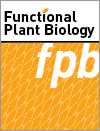
Functional Plant Biology
Volume 48 Number 12 2021
FP21153Post-translational regulation of the membrane transporters contributing to salt tolerance in plants
This review summarises the role of membrane transporters and their regulatory kinases that are required for avoiding the toxicity of sodium in plants in a saline soil. It shows the importance of protein phosphorylation in the regulation of ion transporter activity, focusing on the proteins involved in Na+ uptake, transportation, and cellular sequestration.
FP21153 Abstract | FP21153 Full Text | FP21153PDF (1.3 MB) Open Access Article
FP21165Overexpression of SCL30A from cassava (Manihot esculenta) negatively regulates salt tolerance in Arabidopsis
Cassava (Manihot esculenta Crantz) is one of the major staple foods for developing countries in tropical region. Its production is impacted by abiotic stress impacts such as soil salinity. To develop salt more tolerant cassava species, we cloned a SCL subfamily SCL30A and found it plays a negative role in plant salt stress response. The function of MeSCL30A in plant salt stress found in this study indicates a potential in more resilient cassava variety breeding using techniques like CRISPR/Cas9 systems in the future.
FP21154The mechanisms underlying melatonin improved soybean seedling growth at different nitrogen levels
 , Chunyuan Ren, Liang Cao, Xijun Jin, Mengxue Wang, Mingcong Zhang, Qiang Zhao, He Li, Yuxian Zhang and Gaobo Yu
, Chunyuan Ren, Liang Cao, Xijun Jin, Mengxue Wang, Mingcong Zhang, Qiang Zhao, He Li, Yuxian Zhang and Gaobo Yu
Melatonin plays an important role in positive regulating growth and development of crops and resistance to stress. The effect of melatonin on soybean in different nitrogen level was studied. Results showed that melatonin can alleviate the adverse effects of low nitrogen on soybean by regulating nitrogen absorption and metabolism, and enhance tolerance to high nitrogen by improving antioxidant ability. This may assit in improving the adaptability of legumes with nitrogen fixation function to unsuitable nitrogen levels.
FP21154 Abstract | FP21154 Full Text | FP21154PDF (9.8 MB) | FP21154Supplementary Material (908 KB) Open Access Article
FP21113The antioxidant defense and glyoxalase systems contribute to the thermotolerance of Heliotropium thermophilum
In the recent years, many studies indicated that the coordinated study of antioxidant and glyoxalase pathways is crucial in abiotic stress stresses including extreme temperature tolerance in plants. However, it is not yet known whether improved extreme heat tolerance of thermophile plants by the interactions and the coordinated action of antioxidant and glyoxalase defence systems. The antioxidant defence and glyoxalase systems have strong interactions in conferring extremely heat tolerance in Heliotropium thermophilum through the detoxification of ROS and MG.
FP21054The role of AcPGIP in the kiwifruit (Actinidia chinensis) response to Botrytis cinerea
 , Min Chen, Yu-Xiang Miao, Qiang Li, Yun Ren, Wen-Lin Zhang, Jian-Bin Lan and Yi-Qing Liu
, Min Chen, Yu-Xiang Miao, Qiang Li, Yun Ren, Wen-Lin Zhang, Jian-Bin Lan and Yi-Qing Liu
Grey mould, caused by Botrytis cinerea, causes great economic losses and food safety problems to the kiwifruit (Actinidia deliciosa) industry. In this study, we cloned the AcPGIP gene and used virus-induced gene silencing to explore the function of the PGIP gene in the kiwifruit response to B. cinerea. Our results provide the first clear evidence of a specific role for PGIP in kiwifruit resistance against a fungal pathogen by down-regulation of the gene.
FP21022Comprehensive analysis of 14-3-3 family genes and their responses to cold and drought stress in cucumber
The 14-3-3 proteins play essential roles in regulating various biological processes and abiotic stress responses in plants, but the family members in cucumber remain unclear. Ten 14-3-3 family members were identified from cucumber genome and six genes were segmentally duplicated. Genes playing important roles in different tissues and fruit ripening as well as in response to cold and drought stress were identified.
Jojoba (Simmondsia chinensis (Link) Schneider) oil is an important component of toiletries and medicines, but despite its high industrial value, fundamental information about jojoba’s metabolic reserves and physiology is missing. We performed metabolite, carbohydrate and mineral profiles of the whole plant organs in relation to the annual cycle and developmental stage. Our results enable further studies of this important plant.
Genetic basis determining barley (Hordeum vulgare L.) seed germination and seedling development under TiO2 nanoparticles stress is not well understood. Here, we reported the influnce of nTiO2 on seed germination and seedling development related traits. Using 9K SNPs in genome-wide association scan (GWAS) in diverse barley collection, we determined the genetic factors underlying the natural variation in seed germination and seedling development under nTiO2 stress. We found novel stage- and trait-specific associations that would otherwise not be found by simply scoring seed germination under control condition. Interestingly, many candidate genes detected in this study are also potentially involved in salt stress tolerance.
We investigated 10 selected genes related to smut (Sporisorium scitamineum) resistance on two sugarcane (Saccharum officinarum L.) progenies with contrasting responses to smut infection. The results revealed some genes were down-regulated in the susceptible progeny and up-regulated in the resistant progeny early infection process reflecting an early attempt to halt pathogen development at the infection site. At the late infection, they were up-regulated in the susceptible progeny coincide with whip development. This study revealed a complex interaction between smut pathogen and sugarcane.
FP20247_COCorrigendum to: Does the C4 plant Trianthema portulacastrum (Aizoaceae) exhibit weakly expressed crassulacean acid metabolism (CAM)?
FP20247_CO Abstract | FP20247_COCorrigendum (3.1 MB) Open Access Article




